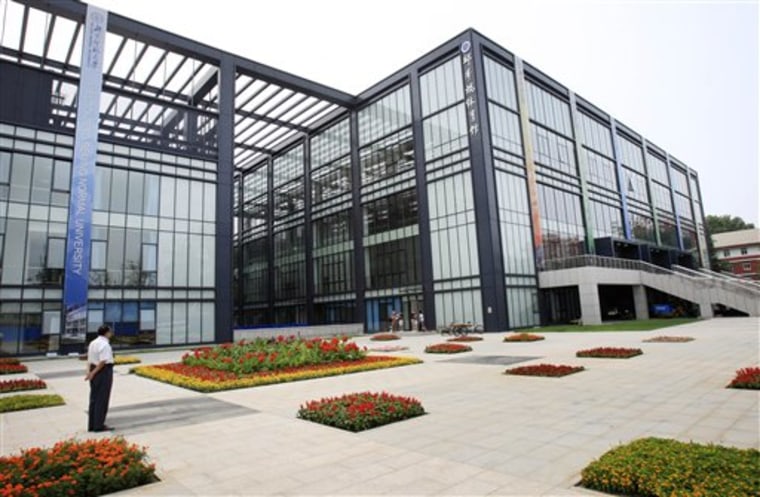The United States' sparkling new training center at a Beijing university is so new, even students there haven't been inside yet.
"Their students walk by and they've never been allowed in this building. All of a sudden a bunch of stinking Americans have shown up and they are occupying the space,'' said Steve Roush, chief of sport performance for the USOC.
When the students at Beijing Normal University finally get in to the recreation center they'll see a 50-meter pool, three gymnasiums, indoor batting cages for baseball, a boxing ring, a plush weightroom, a wrestling room equipped with a sauna, strips for fencing and modern pentathlon, volleyball courts, pingpong tables, mats for martial arts - and a perfectly manicured soccer field.
"This is unbelievable, beautiful — honestly,'' said Tony Azevedo, captain of the men's water polo team, straining under leg and chest exercises Wednesday in the university's weightroom. "I honestly didn't expect anything like this. It's just amazing.''
Eight years ago in Sydney, the United States Olympic Committee rented a warehouse and equipped it sparsely with a few barbells, dumbbells and video equipment.
"Oh, and we jerry-rigged some other stuff,'' Roush said. "Maybe we added some boxing equipment.''
The United States operated a similar facility four years ago in Athens at the American College of Greece, but this one is even better.
"This is our not-so-secret weapon,'' USOC spokesman Darryl Seibel said. "It is a reflection of how increasingly competitive the games have become.''
Teams used to simply show up for the games, check into the athletes' village, and train at the Olympic venues on tight schedules designed to give every country practice time. But this is no longer enough, which will be reflected by the fierce race this time among China, Russia and the United States to top the gold-medal table.
The United States has won the most gold medals in the last three Olympics, but many expect China to be No. 1, capitalizing on the home-country advantage and unmatched depth from its fearsome state-run sports schools.
"Everyone is going to have their strength, but it will be who is picking up the medals in the new sports they have invested in,'' said Roush, who has suggested the U.S. and China might each win more than 40 gold medals. The U.S. won 36 in Athens, four more than China.
The shining university facilities mirror the modern venues for the Olympics. However, Beijing's air pollution is a worry, even for athletes training inside or whose sports will be contested indoors. Despite drastic controls on traffic, construction and factory closures, Beijing's gray haze filled the sky on Wednesday. Officials have said conditions are improving, but some are not convinced.
U.S. men's water polo coach Terry Schroeder said his team arrived Tuesday — a day with nearly blue skies - and noticed the pollution immediately. The USOC, like other national Olympic bodies, has provided optional masks for athletes, which are not designed for training or competition.
No one was seen wearing them on Wednesday.
"Some of the guys today felt a little difficulty in breathing,'' Schroeder said. "And yesterday when I came in was one of the cleaner days in a while. Some of our guys have inherent breathing issues, and to put them in this environment - it's worrisome for sure.''
About 70 U.S. athletes were on the ground on Wednesday and the numbers were expected to surge this weekend with the games set to open on Aug. 8. The U.S. is bringing just under 600 athletes, exceeded only by China with 639.
The official U.S. delegation includes about 1,000 accredited athletes and officials. However, 500 others - trainers, physicians, sports psychologists - also accompany the teams, but lack credentials. They are housed at Beijing Normal, where they are provided meals, access to their athletes and flexibility in training.
"The ability to train when you want to, in the way you need to - in addition to having access to the official venues - makes a huge difference,'' Seibel said. "It's the most distraction-free environment we can create. There are just fewer things for them to worry about.''
